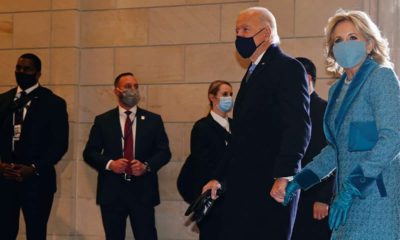Published
5 years agoon
By
CalMatters
California’s public transit agencies deliver a vital service every day, and especially during times of emergency — providing critical mobility options for millions of frontline healthcare, public safety, grocery, and restaurant workers fulfilling essential roles during the COVID-19 pandemic.
But public transit faces an existential crisis over the coming months: a “double whammy” that could result in catastrophic revenue losses threatening the viability and availability of transit services in the near- and long-term.

Opinion
Joshua W. Shaw
Special to CALmatters
First, as Californians responsibly shelter in place, transit ridership and fare revenues have plummeted by more than 90% at many agencies. According to a survey by the California Transit Association, BART saw more than a 94% reduction in ridership and $8.9 million in losses recently. Similarly, LA Metro’s ridership is down by 75% and is losing up to $5.75 million weekly in fare revenue. San Diego’s MTS weekly ridership is down by 75% with a nearly $1.4 million hit to revenues. CalTrain ridership is down 95%, costing $2 million in revenues per week, while Sacramento Regional Transit is down 80% and has lost more than $3 million over the same time period.
Collectively, California’s transit agencies will face approximately $2 billion in lost fare revenue and new operational expenses alone due to the COVID-19 pandemic.
In addition to these fare revenue losses and cost increases, we know a second wave will come crashing down on local transit agencies in the coming months. State and local sales tax revenues will plummet with a slowing economy, undercutting a key source of transit funding. Transit agencies in California rely more on sales tax funding for their core, non-fare-based revenue than do most agencies across the country.
Public transportation agencies are already suspending or dramatically curtailing much of their service, deferring payments to contractors, and/or furloughing employees – limiting mobility options for essential workers and disrupting services during this crisis. These disruptions could become permanent without state action.
Fortunately, the federal relief package provides much needed immediate funding for local transit agencies that will help mitigate the worst and most immediate impacts of COVID-19. The stimulus package includes more than $25 billion in funding to transit agencies throughout the U.S. California agencies are expected to receive approximately $3.75 billion.
But these funds will only stop the immediate bleeding over the coming few months. They will likely not stabilize transit or cover the anticipated losses beyond this summer. By fall, the predicted recession will cut into public transit’s sales tax funding base, which the new federal stimulus funding will likely not cover.
On behalf of our nearly 200 members, the California Transit Association will continue to monitor and report on the real-life impact of the crisis. As part of this effort, we will assess the extent to which new federal funding has slowed the demise of local transit services and the anticipated needs of agencies going forward when sales tax funding declines. Then, we will continue to work with Gov. Gavin Newsom and his administration and legislative leaders to determine if further state relief is needed.
It will likely become imperative that the state support local transit agencies further as part of the anticipated August budget revise — providing new funds to keep the doors open and the trains and buses running through the hard times to come.
We understand there are serious and competing needs for limited state resources. Sustainable and available public transit is absolutely vital in this time of crisis, and also critical to helping our economy get back on track when life resumes to normal by getting millions to work, school, shopping, medical appointments, and other obligations. Prior to the current public health crisis, California’s public transit agencies provided more than 1 billion trips per year.
Local agency leaders are committed to partnering with the governor and state elected leaders. Without action, public transit as we know it may never be the same.
About the Author
Joshua W. Shaw is the executive director of the California Transit Association, a nonprofit organization, [email protected]. He wrote this commentary for CalMatters, a public interest journalism venture committed to explaining how California’s Capitol works and why it matters.


Tulare County Gang Member, Two Fresnans Head to Federal Prison


Study: First 10 Days After Leaving Hospital Pose Deadly Risks for COVID Patients


California Pins Vaccine Hopes on Biden Administration


Bay Area Restaurants, Wineries File Lawsuit Over Outdoor Dining Ban


Madera Hospital, With ICU Inundated, Transfers Patients to Other Facilities


‘Shameful’: US Virus Deaths Top 400k as Trump Leaves Office




